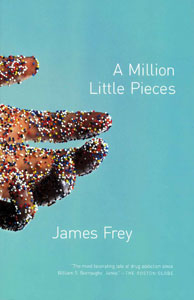
Oprah’s interviews with James Frey and the recent article in Salon about his first interview with Oprah drew intense emotions on both sides of the issue. Some say memoir is fiction anyway–who can really remember honestly exactly what happened in one’s life? So what’s a little tinkering with truth? Others say James Frey is ruining it for everyone (everyone being serious writers of memoir) because as readers question the veracity of all memoirs, memoirs lose their power–why not just read fiction? And some say, “Who cares?”
I’m in the “I care” camp. While there’s no way to capture “the absolute truth” and certain conventions, like dialogue, are generally understood to be an approximation of a conversation colored by the memory and perception of the author, there’s a difference between getting as close to the truth as you can and out and out lying.
Frey told Oprah, “I don’t have a lot of respect for memoir. I think most writers of memoirs do what I do. You play around with things. You tell the best story you can.” Whoa, sounds like a bit of a sociopath to me. But it does beg the question new writers often ask me:
“What can I (and can’t I) do with the truth in my memoir?”
Here are my suggestions:
- In general, don’t make stuff up about people and don’t make up characters–that’s fiction.
- Which brings me to my next point. When is it okay to make stuff up? When you tell your readers up front. If you want to protect someone’s identity, have a note at the beginning of the book saying that you changed some identifying information about a person–and change a few details so they won’t be recognized.
- Too many characters? I’d say it’s okay to do what Shirley MacLaine did in Out on a Limb–she offered an author’s note at the beginning that said one of the characters in the book was fictional, but was a composite of several true friends of hers. The events were real, but in the interest of narrative she made these different friends all one character. Why is it okay? Because she told us up front! If she hadn’t, it wouldn’t be okay.
- Verify whatever information you can–dates, weather, whether a particular song was even out the year that you’re writing about. Anything that doesn’t fit with the truth will call your whole story into question–so research the details you think you remember to make sure you’re as accurate as can be.
What if you can’t quite remember what happened? As you write, experiment. See if you can:
1. Interview others from your past who may be able to jog your memory.
2. Visit places that may help you remember details.
3. Start writing about the parts you do remember.
What if your story includes someone else’s? One of my book writing course participants wanted to include some of her mother’s story in her memoir. She interviewed her mother but there were important gaps. She told the story, spelling out that she imagined much of that chapter based on the information her mom had given her.
Why didn’t Frey sell his book as fiction? He tried and he couldn’t.
Does it pay to lie? It seemed so when Frey’s book made him millions. But now that he’s involved in lawsuits, it seems that Karma may catch up with the uber-creative memoirist. If you really want to make stuff up, do so–just call it fiction.

